- Home
- Francine Rivers
The Prophet: Amos Page 5
The Prophet: Amos Read online
Page 5
The last few survivors of the nation that had often oppressed Israel fell, dissolved into dust, and blew away in the wind, leaving only an echo of Philistia’s grandeur.
“So be it, Lord!” Amos rejoiced. “So be it.”
“Amos!”
He blinked, swayed slightly on the ladder, and grasped hold of a sycamore branch to keep from falling. “What?”
“What? What, you say? What’s the matter with you, my friend?” Jashobeam, the owner of the grove, stood staring up at him, arms akimbo.
“Nothing.”
“Nothing? You’ve been shouting.”
Other workers stared at him.
“I was having a vision.”
“Oh, a vision.” Jashobeam threw back his head and laughed loudly. He waved his hands as he called out to the others. “Amos was having a vision!”
Some laughed. Some leaned out from beneath branches to grin at him.
Jashobeam put his hands on his hips and looked up at him. “Perhaps you need to come down and rest in the shade awhile. Too much heat, I would say. Go have a long cool drink of water with a little wine.”
Face burning, Amos ducked his head. “I’m fine.” Clenching his teeth, he grasped another sycamore fig and made the small slice.
“A vision.” Jashobeam shook his head. “If you have another, try not to shout about it. You distract my workers.” Jashobeam walked away.
Amos was on his way home to Tekoa when the Lord spoke to him again.
The people of Tyre have sinned again and again, and I will not let them go unpunished!
Dropping to his knees, Amos threw himself onto his face.
Israelites stood in the court of the Phoenician king. The heads of state signed documents, swearing a treaty of brotherhood and friendship between Phoenicia and Israel. But then Phoenicians raided, and took whole villages captive to Edom, selling them as slaves.
Amos slammed his fists on the ground. “They tricked us. They broke their word!”
God’s wrath descended in a spear of flame that set the great city of Tyre on fire. The mighty fortresses crumbled in the inferno.
There was no respite for Amos this time as a fourth vision came. Edomites with raised swords chased down their Israelite brothers. Every face was like Esau’s, filled with bitterness and hatred against his brother Jacob, with generation after generation of them raised on the story of how the younger brother had bought the elder’s birthright with a bowl of lentil soup and stripped Esau of his blessing. They sought every opportunity to inflict pain and suffering on Jacob’s descendants. They savored revenge like a sweet dessert, not knowing it would turn their souls sour with poison.
Wailing to heaven, Amos gripped his head. “Stop, Lord. I don’t want to see any more.”
The Edomites caught up with and cut down the fleeing Israelite men. With cries of jubilance and triumph, they stabbed and slashed them, giving free rein to years of pent-up jealousy and rage.
So I will send down fire on Teman, and the fortresses of Bozrah will be destroyed.
Amos watched punishment come upon Esau’s sons. The horror of it made him collapse. He spread his arms, clutching the grass, his cheek pressed against soft earth.
He wandered for days, unsure what to do. “Why do You show me these things, Lord? What am I to do with this knowledge? Tell me!”
The Lord did not answer.
Distraught, burdened by the images of destruction, Amos headed again for Tekoa. He climbed the mountain road from Jericho and took shelter for the night in a small cave. He could look out over the Sea of Salt. To the north were the mountains of Ammon. To the south was Moab.
The people of Ammon have sinned again and again, and I will not let them go unpunished!
Terror gripped Amos as he dwelt within the vision. All his senses awakened. He smelled the smoke of Gilead, the burning flesh. He tasted ash in his mouth. Ammonite warriors attacked Gilead. Lungs straining, he ran with the fleeing Israelites. Gilead burned, but even this destruction did not satisfy the Ammonites, who sought to wipe out the race by knocking pregnant women to the ground. As the women screamed for mercy, the warriors ripped their clothing and cut their bellies open with their swords to kill their unborn children.
Amos screamed. “Why do You stand idly by? Why are You silent? Don’t You see Your enemies killing Your people?” Tears poured down his cheeks as he raged. “Do to them what You did to Egypt and the Midianites. Crush their pride. Destroy them!”
See what I will do.
Fire descended on Rabbah, blazing through the fortresses until they crumbled. Battle cries rose like a whirlwind in a mighty storm and the Ammonites fell, thousands of them, until only a remnant remained. When the battle ended, the king and his princes were fitted in yokes and led away to slavery.
“Yes, Lord!” Amos raised his hands. “Let all the nations see You are supreme over all the earth!”
Another vision came in the wake of Ammon’s destruction.
Moabites opened the graves of Edom’s kings and piled up the bones to burn. When the fires grew cold, workers scraped and swept the lime ashes into vats, where they pounded what remained to dust that they used to make plaster. Amos watched in horror and disgust as the Moabites coated their houses with the bones of Edom’s kings.
“Not even in death are their victims shown mercy!” Amos shouted.
Before his eyes, an army attacked Moab. Foreign warriors shouted. Rams’ horns blew. Flames reached into the sky as Kerioth burned while the people of Moab fell in the noise of battle. Neither their king nor their princes survived the slaughter. Those who had taken the bones of the dead from tombs would never rest in one.
The enemies of Israel would fall. Those who thought they held power would become powerless. God would avenge those who had been skinned alive, those who had been executed, their heads stacked as trophies before the Aramean city gates. No more would Philistia profit on slave trade. No more would Phoenicia break treaties of peace and take whole villages captive into slavery. No more would Edom grow rich on revenge. All of them would die, having drunk the poison of lust and hatred, from Damascus to Ammon and Moab, begun by Lot’s incestuous daughters. All of them would be crushed like scorpions beneath the heel of God’s anger.
A deep satisfaction had filled Amos at the thought of their destruction. Exhausted, Amos curled on his side in the shallow cave, comforted. When, Lord? When will it happen?
Soon, he hoped. He would relish the sight of it.
Amos arose in the morning and offered a prayer of thanksgiving. It was the first he had said—and meant—in years. “Give thanks to the Lord Almighty, for the Lord is compassionate and gracious, slow to anger, abounding in love.”
Caravans wound their way up the Benjamin Mountains. Men pulled at roped donkeys laden with packs. As Amos walked up the mountain road, uneasiness filled him. When he reached the Mount of Olives, he stopped and stared, troubled in his soul. He thought again of the corruption he saw every time he went to Jerusalem. Priests like Heled profited off stealing from God. Had Amos not cut his share and built his flock from those same lambs? He shuddered at his guilt. What choice had those priests given his father? Frustrated by helplessness, he tried to make excuses. None sufficed. Words spoken long ago, when he was a child attending classes, came back to him. Burning words that rent his conscience:
“Hear, O Israel. You must love the Lord your God with all your heart, all your soul, and all your strength.”
Love had not motivated his rebellion against Heled, nor had righteousness or any desire to worship the Lord. He had not loved God. He had blamed the Lord for the trouble men caused and the contract under which his family lived. Each time he went to the Temple, he did so grudgingly and offered only what was required to keep in good standing with the authorities.
Uzziah might be king, but all too often it was the priests who ruled the lives of common people like himself and his brothers.
The Lord is God!
But even now, as he stood looking up
at King David’s Zion, Amos knew idols still pocked Judah’s landscape, and pagan altars still remained despite King Uzziah’s attempt to destroy the foreign gods that had dwelt in the hearts of King Solomon’s wives and concubines. How could a wise man be so foolish as to build pagan temples and altars? Amos saw the remnants of those gods as he moved his flocks. Sometimes he had been tempted to follow the processions up those hills so that he could spread himself beneath the leafy branches and enjoy the sensual pleasures offered there. It had not been fear of the Lord that kept him away, but fear of leaving his flock untended.
You must not have any other god but Me. You must not make for yourself an idol of any kind.
Sin was everywhere. It was in the nations surrounding Judah and Israel. It was in Israel and Judah.
It was in him.
Not once have I sought out one of the few priests known to serve in fear of the Lord! I have held my anger close, embracing it, fanning my hatred against all Your priests. I have rebelled against You.
You must not misuse the name of the Lord your God.
Amos cringed. Yes, Heled and others like him were guilty, but Amos’s family had entered into a contract that dishonored God as well. How many times had they used God’s name to seal a bargain?
“Stand aside!” Someone shoved him from behind.
Amos moved out of the way, seeing everything differently.
Remember to observe the Sabbath day by keeping it holy.
Did the gates of Jerusalem not stand open for trade every day of the week? The markets of the great city never rested. Amos watched the beehive of activity as merchants bore their wares into Jerusalem past elders holding court in the gate.
Other commandments came in a rush:
Honor your father and mother. You must not murder. You must not commit adultery. You must not steal. You must not testify falsely against your neighbor. You must not covet your neighbor’s house. You must not covet your neighbor’s wife, male or female servant, ox or donkey, or anything else that belongs to your neighbor.
Amos closed his eyes. Though he had never broken these commandments in deed, he knew he had broken every one of them in thought.
He had loved his father, but had been bitterly disappointed in him. Not once after he had learned the truth had he believed anything his father said.
And how many times had he lusted for revenge against Heled? He had even thought of ways to kill him, savoring the thought in his mind. If he could have found a way to kill the priest and escape, he might have done it!
From the time he was born until two years ago, he had been a thief, a party to the priests who testified falsely against those who brought perfect offerings to the Lord, only to have them rejected.
As for the sin of coveting, had he not coveted the priests’ power, freedom, and wealth? He had not so much wanted it for himself as he had wanted to see it ripped from the hands that had grasped it and held on at such cost to the people.
Amos saw what God wanted him to see and stood mortified by the sins of the people, sins he himself had committed on a daily basis.
And when God spoke, His next words were no surprise.
The people of Judah have sinned again and again, and I will not let them go unpunished! They have rejected the instruction of the Lord, refusing to obey His decrees. They have been led astray by the same lies that deceived their ancestors.
The hair on the back of Amos’s neck prickled. He dropped to his knees and covered his face. He rocked forward, covering his head with his hands. “No, Lord, please, don’t show me.” He drew his knees up under him. “Have mercy on us.”
But the images came upon him relentlessly, melting his heart and filling him with a sorrow and compassion he had never felt before when looking upon his own people. The compassion he’d felt until now only for his defenseless sheep. He wept.
“You there. You’re blocking us.” Hauled up, he was pitched aside and fell heavily. “Stay off the road!”
Heavy wheels crunched the rocks. Oxen blew out their breath. The voices of a thousand people mingled as Amos sat in the dust, his head in his hands.
“To what end, Lord? To what end will You destroy the people You chose?”
From the ruins I will rebuild it and restore its former glory, so that the rest of humanity, including the Gentiles—all those I have called to be Mine—might seek Me.
“What are you doing back so soon?” Bani rose from his money table. When he came close, he frowned. “What’s happened? Is Ithai well?”
“I have not seen Ithai or Elkanan in months. Remember, they had finished their business with Joram before I returned with my flock. They came here to Jerusalem before I did.”
Ahiam closed the gate of a stall, a lamb in his arms. “The boys went home to Tekoa not long after the new moon festival.”
Amos looked at his two brothers. “The Lord spoke to me. I have seen visions.”
Ahiam laughed. “Go sleep off the wine over there.” He walked away with the lamb.
“You’ve probably had a fever.” Bani searched Amos’s face. “You do look ill.”
“I have seen the destruction of Jerusalem.”
“You’re mad. With Uzziah on the throne?” Bani shook his head. “Jerusalem is secure, and our borders are protected.”
“But I’m telling you the truth! I saw—”
“Fever-induced dreams, Amos.” Bani gripped his arm. “That’s all. Besides, why would God speak to you, a shepherd? You’re not a member of the priests’ guild. You’re not a Levite. When God speaks, He talks to one of the trained prophets or priests. Go over there. Sit. You look tired.” He led Amos to the bench beneath the canopy where their tables were set up for business.
Amos saw the open box with its neat rows of coins and shuddered.
Bani slapped him on the back. “Have some wine, little brother. Eat something. Forget about whatever you thought you saw. You’ll feel better.” Bani poured him a cup of wine and offered him bread and dates. “You spend too much time alone with that flock of yours, little brother. You always have.”
The hum of conversations merged with the bleating sheep until the sounds seemed the same. Amos clutched his head. Am I going mad that men are beginning to sound like sheep, or sheep are beginning to sound like men?
Ahiam returned. “Heled is not pleased to see you, Amos. Joram gave him a bad report when he returned from Tekoa, and Heled hasn’t forgotten.”
Amos raised his head. “If you don’t end your dealings with that thief of a priest, you and your family will suffer for it.”
Ahiam’s face hardened. “Live your life, Amos, and leave mine in peace.” He gave a hard laugh. “If we took your advice, we’d all be living in the hills, half starved and seeing visions.”
“Leave him alone, Ahiam.”
“He makes trouble for us. Even when he can keep his mouth shut, he allows his contempt to show. Look at him!” Ahiam leaned toward Amos. “You look like a beggar.”
“He’s given both our sons a start on flocks of their own.”
“A lot of good it will do them if he keeps on as he has. Everything we’ve all worked for, for over two generations, will be gone!” He glared at Amos. “It happened before. Remember what Father told you. It can happen again. Don’t think it can’t.” He jerked his head. “You forget who holds the power around here.”
Amos rose, shaking with rage. “God holds the power!”
Chin jutting, Ahiam came close enough to stand nose to nose with Amos. “And He gave it to them to use as they will.”
Amos stood his ground. “The people of Judah have sinned—”
“All of a sudden, you’re the judge?” Ahiam gave him a hard shove. “Go home. Prophesy to your sheep.”
“Listen to me,” Amos cried out in desperation.
“If you made any sense, I might.” Ahiam glanced back over his shoulder. “Send him home.” He nodded to Bani. “We’ve got a business to run here.” Turning his back on them, he walked toward a customer looking
over the lambs. Smiling, he spread his arms in greeting.
Bani drew Amos aside and spoke quietly. “Go back to my house. A few nights’ rest in a good bed and some of my wife’s cooking and you’ll be yourself again.”
Amos knew he would never be the same again. Everywhere he looked, he saw things differently than he had before the Voice had spoken to him.
Dream or no dream, his life had changed forever.
Amos left the Temple Mount and its stalls of sacrificial animals, passing tables where money changers stacked shekels and half shekels. He went down to the market square where bellowing camels with tasseled harnesses stood laden with huge packs of merchandise. The animals were lined up behind owners who displayed their wares on woven rugs. The scents of dung and spices mingled while vendors shouted their wares, competing with one another as possible customers wandered the bazaar. Shekels clinked and money boxes slammed shut. Donkeys burdened with bundles were pulled along by hard-faced men, cursing and making threats if others did not make room.
Bludgeoned by sound, Amos sought quieter streets. He wandered along narrow alleys lined with booths. Vendors haggled with customers over prices while competitors called enticements to steal patrons away.
“Good shepherd!” one called to Amos. “Come, come! You need a new pair of sandals. Those look worn through. I will give you a good price.”
“I will give you a better price.”
“He’s a thief. Don’t listen to him. I have better—”
“Here! Come look at what I have to offer.”
The narrow street widened, and Amos stopped to watch stonemasons working on a new house, a foreman shouting instructions to his crew. A few doors down, a carpenter worked on a cart. Wheels of all sizes lined the wall of his shop. Another man planed a table while his wife showed a bench to a woman with three children.
On another street, metalworkers pounded ingots into utensils while coppersmiths pounded trays. A goldsmith displayed earrings, bracelets, necklaces, and cylinders ready for engraving into family seals. Weavers sold cloths and rugs on another street, while the next was lined with bakers. Amos’s stomach clenched with hunger, but he didn’t stop. He had no money with which to buy. Distracted, he took dried grain from his scrip to ease the ache in his belly.

 An Echo in the Darkness
An Echo in the Darkness A Lineage of Grace
A Lineage of Grace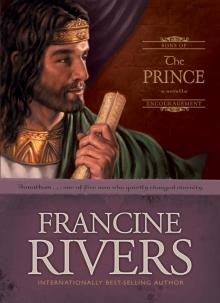 The Prince: Jonathan
The Prince: Jonathan Bridge to Haven
Bridge to Haven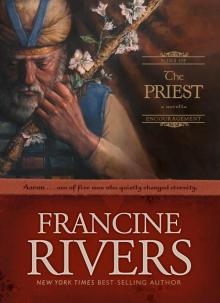 The Priest: Aaron
The Priest: Aaron Her Mother's Hope
Her Mother's Hope Redeeming Love
Redeeming Love The Scarlet Thread
The Scarlet Thread The Masterpiece
The Masterpiece The Last Sin Eater
The Last Sin Eater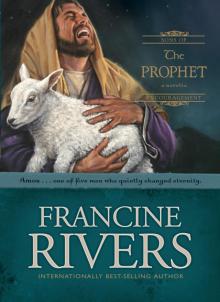 The Prophet: Amos
The Prophet: Amos As Sure as the Dawn
As Sure as the Dawn Her Daughter's Dream
Her Daughter's Dream A Voice in the Wind
A Voice in the Wind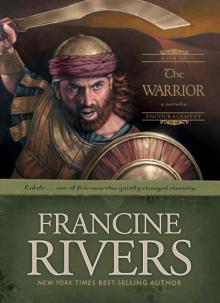 The Warrior: Caleb
The Warrior: Caleb The Scribe: Silas
The Scribe: Silas And the Shofar Blew
And the Shofar Blew The Atonement Child
The Atonement Child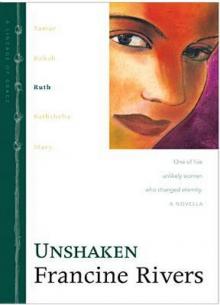 Unshaken_Ruth
Unshaken_Ruth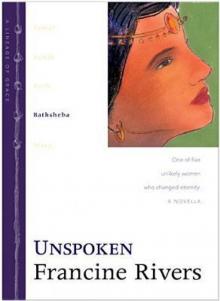 Unspoken_Bathsheba
Unspoken_Bathsheba The Scribe
The Scribe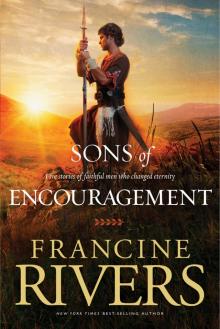 Sons of Encouragement
Sons of Encouragement The Shoe Box
The Shoe Box Sycamore Hill
Sycamore Hill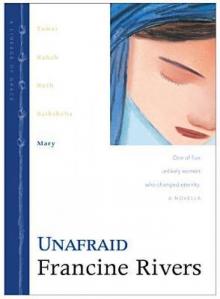 Unafraid_Mary
Unafraid_Mary Marta's Legacy Collection
Marta's Legacy Collection